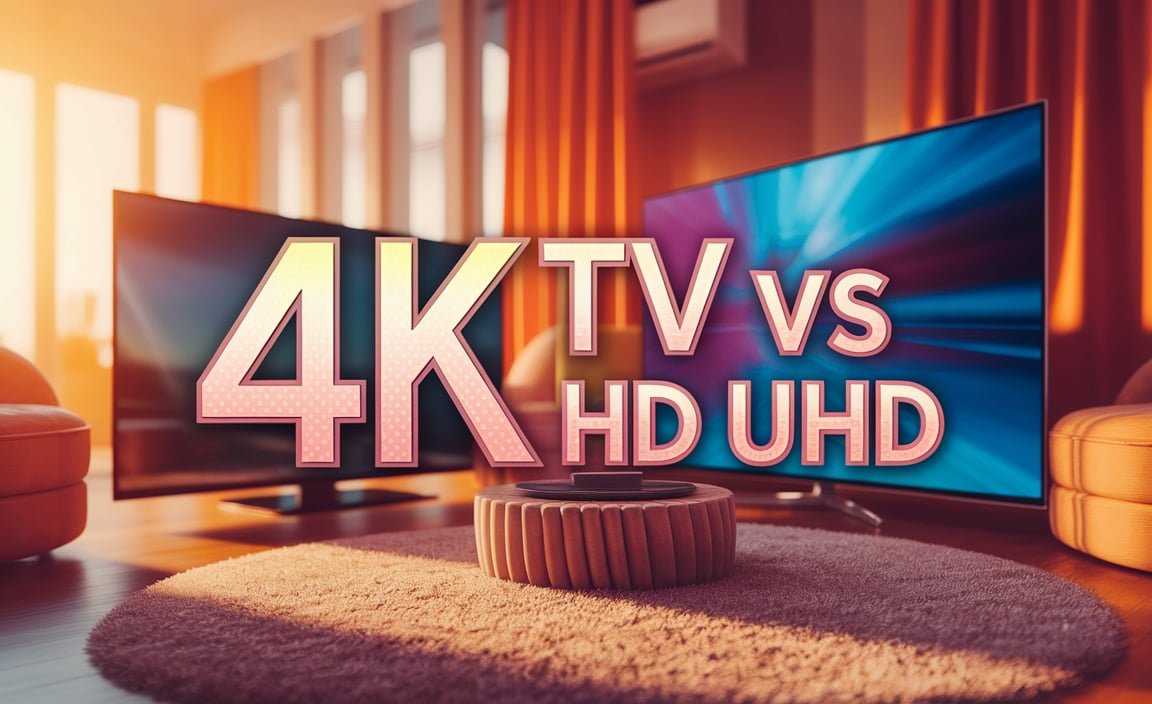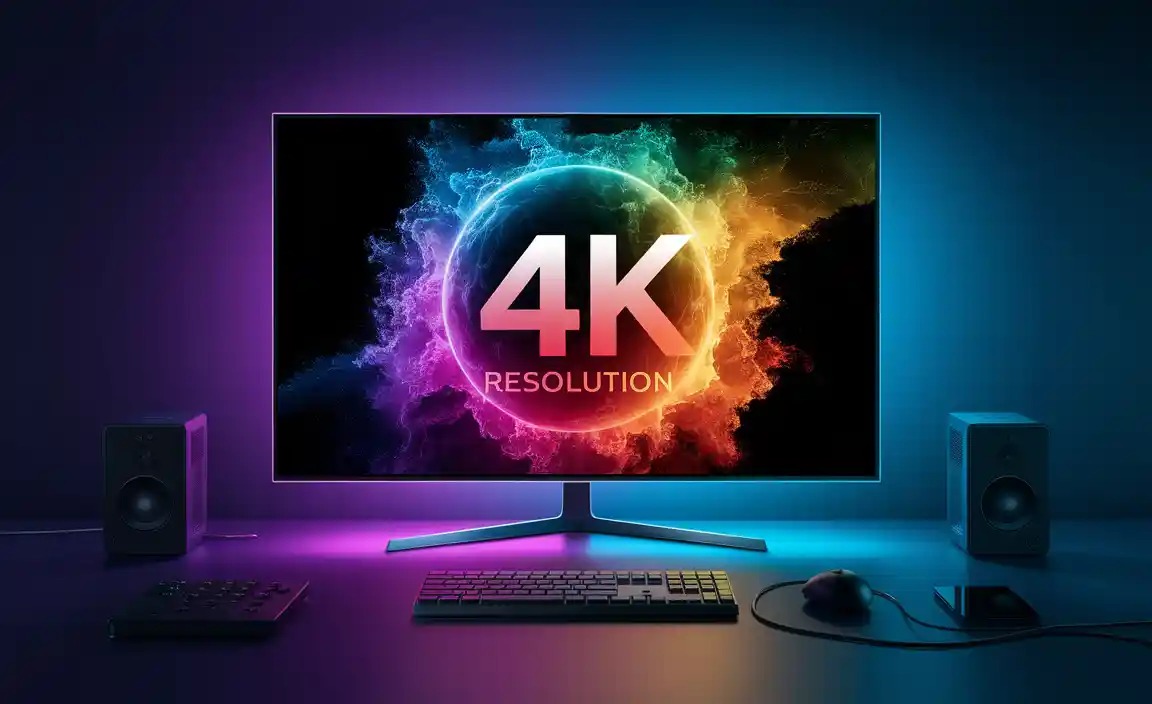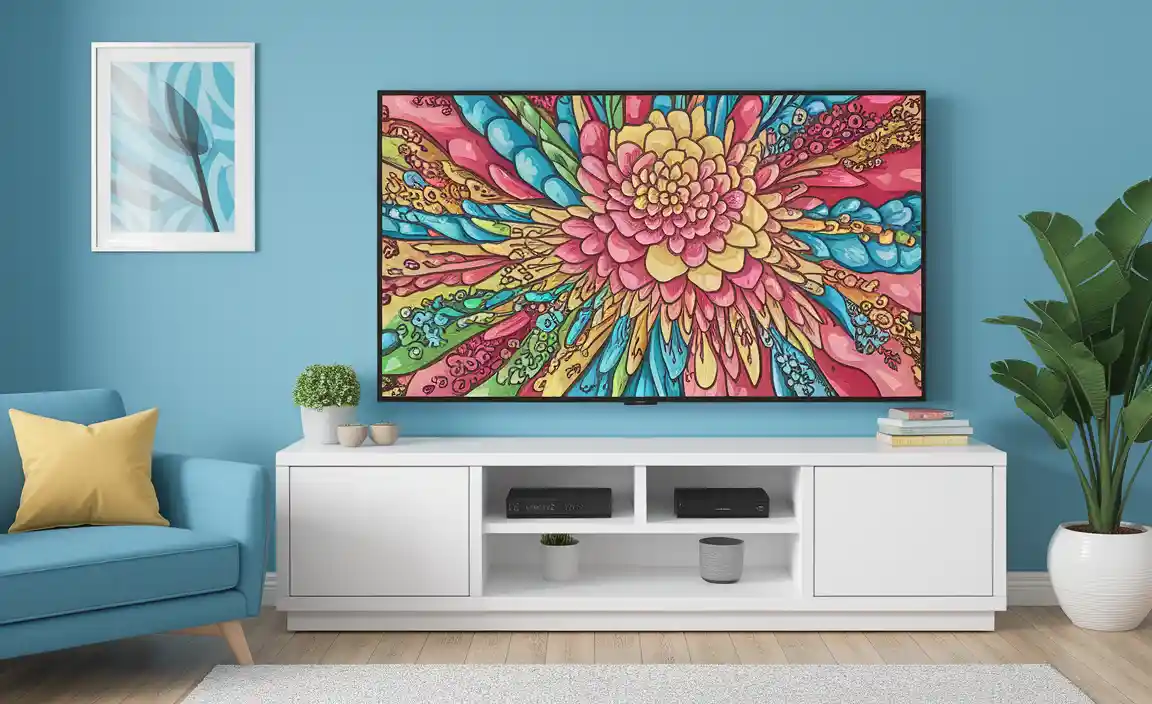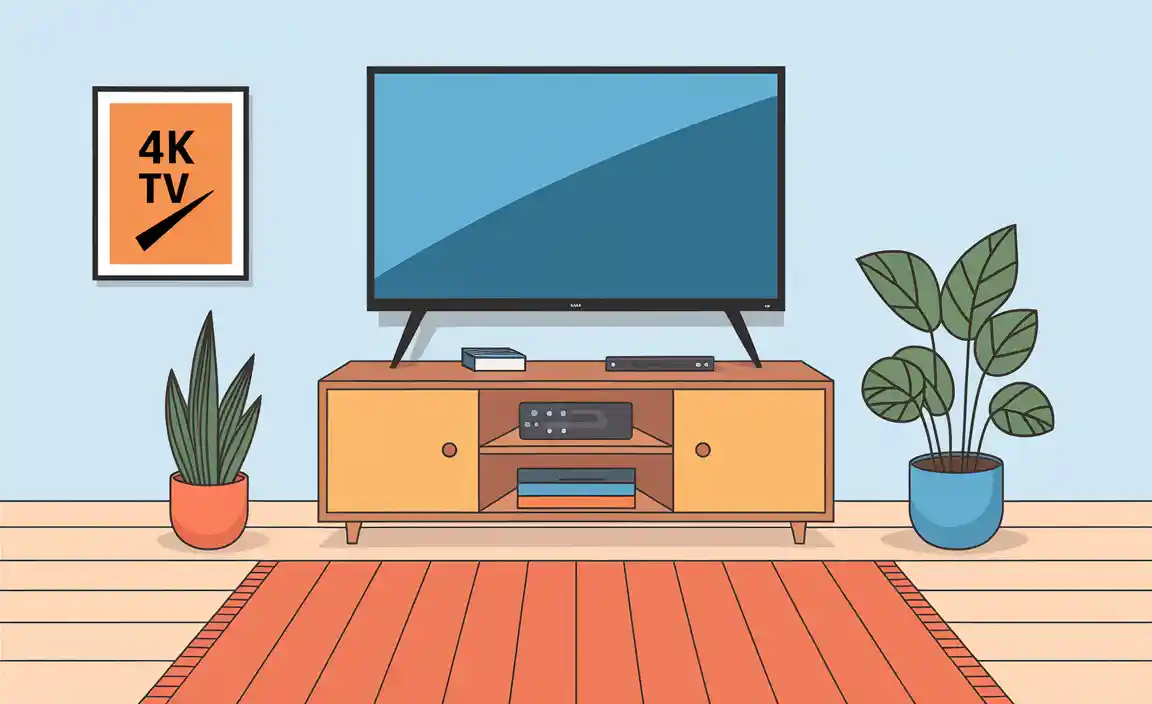Your living room feels empty without a great TV. But should you choose a 4K TV or stick to Full HD? It’s a big question for many buyers today. Imagine watching your favorite movie with clear details and bright colors. Wouldn’t that be amazing?
4K TVs show four times more detail than Full HD TVs. Most people are surprised to learn this. It means you see every tiny detail. But is it worth the extra cost? That’s what we will explore in this article. You might also wonder about the value of Ultra High Definition (UHD). Is it just a fancy name, or does it really make a difference?
Join us on this journey to uncover the truth behind 4K TV vs Full HD UHD. You may find that the right choice could change how you enjoy movies and shows forever!

4K Tv Vs Full Hd Uhd: Choosing The Best Resolution For You
What’s the difference between a 4K TV and Full HD UHD? 4K TVs display images at four times the resolution of Full HD, offering sharper details. This means everything looks clearer and more vibrant. Imagine watching your favorite movie where every leaf on a tree is visible. While Full HD is good, 4K makes it amazing. If you enjoy deep colors and stunning visuals, investing in a 4K TV is worth it!
Understanding 4K and Full HD Resolutions

Definition and specifications of 4K resolution. Definition and specifications of Full HD resolution. 4K resolution is a type of screen detail that shows very clear images. It has a resolution of 3840 x 2160 pixels. This means it offers four times more detail than Full HD. Full HD, on the other hand, provides 1920 x 1080 pixels. While both are good, 4K is sharper and brings more colors to life. Many love 4K for watching movies and playing games!
What is the difference between 4K and Full HD?
4K has four times the pixels of Full HD. This results in clearer images and better colors. Full HD is still great for many TVs and viewers. However, if you want the best detail and experience, 4K is the way to go.
Key Differences Between 4K and Full HD
Pixel count and detail comparison. Impact on screen size and viewing distance. Differences between 4K and Full HD are quite striking! First, 4K TVs boast about four times the pixel count of Full HD. That’s like comparing a super detailed painting to a doodle! This extra detail shines on big screens. You can sit closer without noticing blurry images. If your couch is near the screen, the 4K’s clarity keeps you hooked. For a quick peek, here’s a simple breakdown:

| Aspect | 4K | Full HD |
|---|---|---|
| Pixel Count | 8.3 million | 2.1 million |
| Ideal Viewing Distance | Closer for better clarity | Farther away is better |
In a nutshell, when it comes to viewing experience, 4K is like having your cake and eating it too—in super high detail!
Image Quality: Colors, Contrast, and Brightness
Analysis of color accuracy in 4K vs Full HD. The role of HDR (High Dynamic Range) in enhancing visuals.
Imagine waking up your TV! That’s the fun of watching in 4K. Colors pop, showing reds like ripe strawberries and blues like the sea. Full HD gives good visuals but not as much detail. Adding HDR makes everything brighter and better. It enhances contrasts, bringing dark shadows and bright highlights alive. Having HDR is like adding sprinkles to cupcakes—makes it even sweeter!
| Feature | Full HD | 4K UHD |
|---|---|---|
| Color Accuracy | Good | Excellent |
| Contrast | Decent | Vivid |
| Brightness | Average | Brilliant with HDR |
So, if you want to enjoy every scene, especially big action moments or sunsets, 4K with HDR is the way to go. You’ll feel like you’re right there! Got the popcorn ready?
Content Availability: Streaming and Broadcasting
Availability of 4K content on streaming platforms. Comparison of Full HD content and its accessibility.
Finding your favorite shows in 4K can feel like hunting for gold! 🌟 Many streaming platforms, like Netflix and Disney+, offer 4K content. It’s like watching a movie in a park with a bright sunny day versus a foggy evening. While Full HD has plenty to offer, its selection can feel like finding only one flavor of ice cream. Yummy, but wouldn’t you want more choices? Here’s a quick look:
| Content Type | 4K UHD | Full HD |
|---|---|---|
| Streaming Platforms | Widely available | Mostly available |
| Access to Shows | More popular titles | Classic favorites |
So, if you want to dive into details that pop, 4K is the way to go. Otherwise, Full HD is still a buddy that shares good stories!
Gaming Performance: Which is Better for Gamers?
Advantages of 4K in gaming experiences. The relevance of Full HD for competitive gaming.
Gamers often wonder which TV option better suits their needs. A 4K TV provides stunning visuals with sharper images and more vibrant colors. It truly feels like you could step into the game! This makes adventures more enjoyable. However, for competitive gamers, Full HD shines in fast-paced games. It delivers a smooth experience, allowing quick reactions. Think about it: who wants to lose because of lag? Here’s a quick comparison:
| Aspect | 4K TV | Full HD |
|---|---|---|
| Picture Quality | High detail, vibrant colors | Good detail, but less sharp |
| Response Time | Generally slower | Faster, ideal for slick gameplay |
| Best For | Immersion in adventures | Competitive gaming |
So, if you want to dive into beautiful worlds, choose 4K. For competitive thrills, stick with Full HD.
Pricing Comparison: 4K TVs vs Full HD TVs
Current market trends and pricing for both resolutions. Cost effectiveness and value for different user needs. Prices for 4K TVs and Full HD TVs can vary quite a bit. Right now, most Full HD TVs cost less, often around $300 to $600.
In comparison, 4K TVs usually start at $400 and can skyrocket to $3,000 or more for fancy models. While 4K offers stunning detail, everyone doesn’t need that super crisp view. If you love watching cartoons or playing video games, a Full HD TV might be just right for your cozy den. Check out the pricing trend in the table below!

| Type | Price Range | Best For |
|---|---|---|
| Full HD TV | $300 – $600 | Casual viewers |
| 4K TV | $400 – $3,000+ | Movie lovers & gamers |
In the end, it’s all about what fits your needs. Remember, a clear picture is great, but who really wants to pay an arm and a leg for a fancy screen? Choose wisely!
Future-Proofing Your Home Entertainment System
Why 4K is considered more futureproof. Predictions for the evolution of home entertainment technology.
Upgrading to a 4K TV is smart for your entertainment future. With more shows and movies being made in 4K, it’s like getting a VIP ticket to the movie theater right in your living room! Plus, technology keeps getting better. Think of it as buying the latest phone; it won’t be outdated tomorrow. Many experts predict that 4K will become the new standard, making your home ready for the newest streaming options.
| Aspect | Full HD | 4K UHD |
|---|---|---|
| Resolution | 1920 x 1080 pixels | 3840 x 2160 pixels |
| Content Availability | Limited | Growing rapidly |
| Futureproof Level | Low | High |
So, if you’re still rocking that old Full HD TV, it might be time for an upgrade. Don’t get left behind while everyone else is enjoying crystal-clear adventures!
Recommendations Based on Viewing Habits
Suitability of 4K for movie enthusiasts and content creators. How Full HD still meets basic viewing needs for casual viewers.
Movie lovers and content creators, listen up! If you savor stunning visuals, 4K TVs are your best buddies. They turn every film into a masterpiece. Imagine watching your favorite action flicks with jaw-dropping detail! On the flip side, Full HD is still a champ for casual viewers. It gives a solid picture for binge-watching shows without breaking the bank. It’s like choosing between a fancy dinner and a comforting slice of pizza—both fill you up, but one is a bit more special!
| Viewing Habits | Best Option |
|---|---|
| Movie enthusiasts | 4K TV |
| Casual viewers | Full HD |
| Content creators | 4K TV |
Conclusion
In conclusion, 4K TVs offer sharper images and better colors than Full HD UHD. They provide a more immersive viewing experience, especially on larger screens. If you enjoy detailed visuals, you might prefer 4K. Consider your budget and how often you watch TV. For the best choice, explore more reviews and comparisons online to find what suits you best!
FAQs
What Are The Main Differences In Resolution Between Tvs And Full Hd Tvs?
The main difference between regular TVs and Full HD TVs is the number of tiny dots on the screen. Regular TVs usually have fewer dots, so the picture is not as clear. Full HD TVs have more dots, which makes the images sharper and more colorful. This means you can see details better in movies and shows. So, if you want a clear picture, Full HD is the way to go!
How Does The Viewing Experience Of Content Compare To That Of Full Hd Content?
Watching content in Full HD means you see clear and bright pictures. It has more detail than regular HD. The colors pop and look more real. This makes it more fun and exciting to watch movies and shows. You might feel like you’re part of the action!
Are There Significant Price Differences Between Tvs And Full Hd Tvs, And What Factors Influence These Prices?
Yes, there are price differences between TVs and Full HD TVs. Full HD TVs usually cost more because they show clearer pictures. Factors that influence these prices include size, brand, and special features. Bigger TVs or those with cool extras often cost more. So, the type and quality affect what you pay.
What Types Of Content Are Available In Resolution, And Is It Worth Investing In A Tv If Most Content Is Still In Full Hd?
There are different types of TV content. You can find Full HD (FHD), which is very clear, and 4K, which is even sharper. Many movies and shows are now available in 4K. If you buy a new TV, you can enjoy this clearer picture, even if some things are still in FHD. So, it might be worth investing in a new TV for the best experience!
How Do Hdr (High Dynamic Range) Features Impact The Visual Quality Of Tvs Compared To Full Hd Tvs?
HDR stands for High Dynamic Range. It makes colors brighter and sharper on your TV. With HDR, you see more detail in both dark and bright areas. This means movies and games look more real and exciting. Full HD TVs are good, but HDR TVs show even better pictures.
Resource:
- How HDR Enhances TV Picture Quality: https://www.rtings.com/tv/learn/hdr
- Guide to Optimal TV Viewing Distance: https://www.crutchfield.com/S-Vy6X6R2EyNa/learn/learningcenter/home/tvplacement.html
- 4K Streaming on Netflix: What You Need to Know: https://help.netflix.com/en/node/13444







